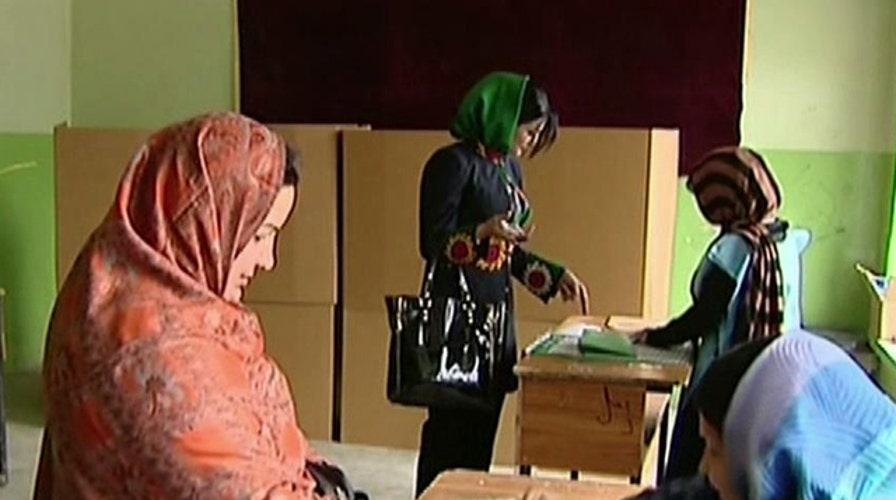Afghans defy Taliban threats to vote in presidential election
Conor Powell reports from Afghanistan
Americans must have been shocked by the news: Afghans turned out in record numbers over the weekend to vote in a mostly peaceful nationwide election.
Despite threats of violence and a two-month wave of suicide bombings intended to disrupt the struggling country’s democratic process, more than 7 million Afghans – 60 percent of the electorate, more than twice the number who voted in 2009 – lined up to cast ballots.
Demand was such that polling hours were extended; those who participated were jubilant. “The enemies of Afghanistan have been defeated,” one official said.
[pullquote]
These are enormous strides for a country that many have written off as irredeemable. Does the U.S. deserve some of the credit?
Yes, but you’re unlikely to hear that from our media – or from the Obama White House. A Pew poll showed that 52 percent of our country considers that we have “mostly failed” in Afghanistan.
Why wouldn’t they?
Other than sporadic reports of murder and mayhem, our news industry has long stopped talking about U.S. activities in Afghanistan.
So has President Obama, after earlier endorsing what he called the “right” war during his first presidential campaign, in an effort to convince the country that his anti-Iraq vote didn’t make him a peacenik.
President Obama and his acolytes have keen political sensors. They have read the polls: Americans are tired of war, tired of the cost and the uncertain gains bought with so much blood and treasure. Best to ignore our engagement in Afghanistan, even though we still have more than 30,000 troops deployed in the country and even though over 2,000 members of our military have died there.
Notwithstanding politics, surely the families of those wounded and killed deserve to know that their sacrifices meant something.
What can we tell them our engagement has produced?
A lot, and especially for women. According to our embassy in Kabul, USAID has built over 680 schools since 2002 in cooperation with the Afghan government, allowing for the enrollment of almost 7 million students – 37 percent of them girls – in primary and secondary schools.
When the Taliban ruled the country in 2001, fewer than 900,000 boys (and not a single girl) were in school. Today there are more than 164,000 practicing teachers, of whom 30 percent are female, up from 20,000 a little over a decade ago.
Because the Taliban were run out of power, a vibrant news industry flourishes today. While the Taliban banned TV and allowed only one religious radio station, today there are dozens of TV channels and hundreds of radio stations. Astonishingly, two-thirds of Afghans are using cellphones.
USAID has also financed and helped build 530 health facilities in Afghanistan, trained 21,000 health care providers, improved the availability of health care for women and produced a decline in infant mortality.
Our workers and our military have built almost 1,550 miles of roads, added 230 MW of electricity generation, providing power to 1.5 million people in Kabul, and given 300,000 people access to safe drinking water.
Moreover, because of the efforts of AID workers and the improved safety that American troops have provided, agriculture has grown, government revenues have increased, unemployment is reduced and communications networks are vastly expanded. In fact, according to the World Bank, Afghanistan’s economy grew at better than 9 percent between 2003 and 2012.
These are just a few of the “wins” that you don’t hear much about, but that encouraged the people of Afghanistan to come out and vote.
The election was not perfect: Some were already charging instances of fraud, polling places failed to open in certain unsafe rural areas and there were isolated acts of violence. But, in one location where a bombing scattered would-be voters, people quickly reassembled; one waiting to cast his ballot claimed, “I was concerned about our safety, but we considered voting our duty.” Women, especially, turned out in record numbers, while for the first time there were two women running for national office.
Americans should be proud that our troops, AID workers and allies have improved the lives of so many in such a hostile and primitive country.
In a piece about the election, The New York Times quoted an Afghan farmer as saying, “I want change and a good government and I am asking the man I am going to elect as the next president to bring an end to the suffering of this war.”
That seems a reasonable ambition – and one that may not be met if the Obama administration fails to win agreement on our ongoing presence in the country.
There is much work left to do in Afghanistan before we can be confident that the gains of the last decade will stick. The best news about the recent election is that it included the deployment of a massive number of Afghan soldiers and police – some 400,000 – who are critical to the country’s future stability.
President Hamid Karzai, who has been in office for 12 years and with whom the White House’s relations have been strained, has refused to sign a long-term security agreement with the U.S. and its allies. It appears that the leading candidates in the election have all promised to enter into such an arrangement, though a deal may have to wait until much later this year, when an expected run-off vote takes place.
Wading through that negotiation may test the patience of Americans who feel we have already contributed more than our share to Afghanistan’s future.
Still, President Obama should not chuck overboard the hard-earned progress made in Afghanistan. For the sake of those who have served in Afghanistan, and their families, and for the citizens of that now-hopeful country, the president must look beyond short-term politics.

